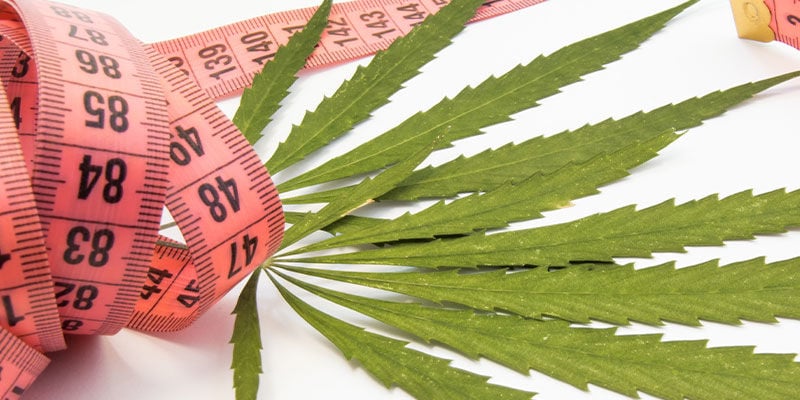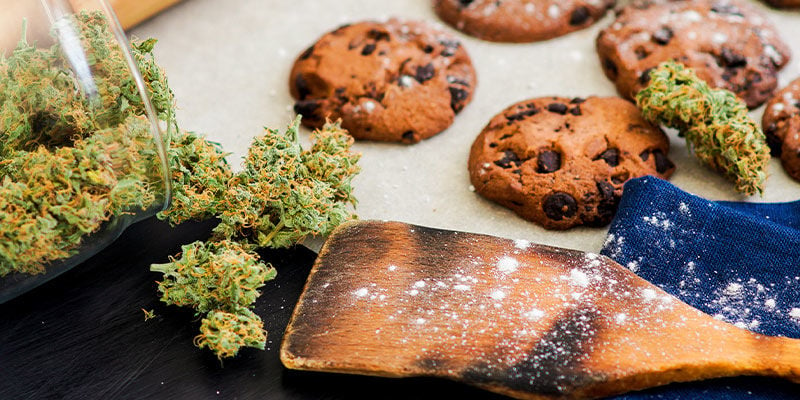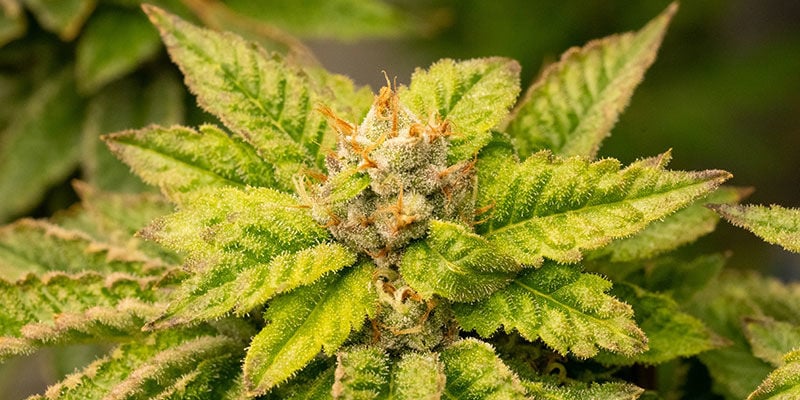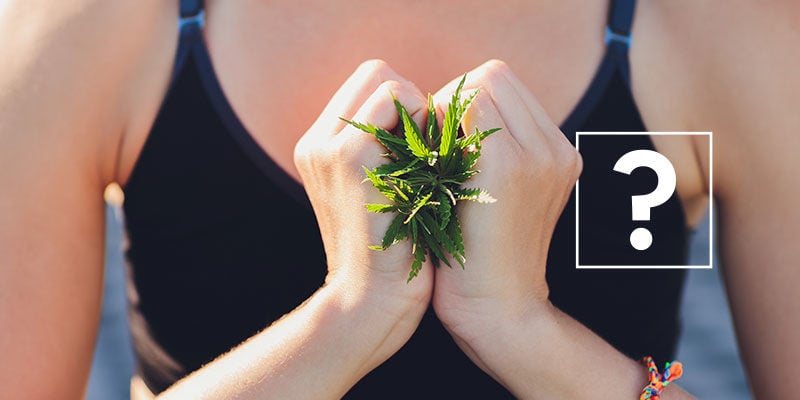
Can Weed Help You Lose Weight?
Cannabis is said to be an appetite-booster because it promotes the "munchies". However, research argues that it could also help with weight loss. In this article, we take a deeper look at how all of this is connected, and if cannabis could indeed help individuals in their weight loss journey.
When people talk about cannabis use in regard to food intake, the “munchies” automatically comes to mind. Without getting too scientific, it's the phenomenon that causes people to feel unusually hungry after smoking some weed. And did you know that medical cannabis is often used to stimulate appetite and help patients gain weight?
But even with an increased appetite, various studies claim that cannabis users have a reduced likelihood of being overweight. So, how does cannabis fare when it comes to losing weight? Let's take a look.
Should you smoke to lose weight?

A survey carried out in 2011 (Le Strat & Le Foll) details that obesity rates were higher amongst those that didn't smoke cannabis compared to those that did. So, is the key to losing weight lighting up a fat joint? Not exactly. As we know, there are many different factors involved in losing weight, and research points to a few areas in which cannabis might have a substantial impact.
With the possibility to soothe the body, cannabis may address some mobility concerns amongst users, allowing them, in turn, to exercise a little more. Also, many cannabis smokers opt to forgo alcoholic drinks. This means that fewer excess calories are consumed. Poor sleep can also play a role in weight gain; since smoking cannabis is synonymous with relaxation, a better night's sleep can help to maintain weight loss.
What about the munchies?
You may have seen it in movies like Harold & Kumar Go to White Castle; smoking a good amount of marijuana may urge an individual to consume a copious amount of food.
The portrayal of the munchies in these films may be a bit hyperbolic, but it’s not too far-fetched. But what exactly causes these sudden cravings?
According to research (Stromberg, 2014), it all lies in the olfactory bulb, a part of the brain which processes smell. In an experiment carried out on lab rats, THC was studied for its ability to increase the sensation of smell and taste when eating food.
Ultimately, the study implies that if marijuana use heightens sensations related to eating food, it could potentially boost the appetite as well. Simply put, if food seems to taste or smell nicer, you'll probably want to eat more of it.
Understanding the link between weed and weight loss

Weight loss entails a lot of moving parts. But here's the simplest explanation; when you create a calorie deficit, you lose weight.
Your body constantly burns calories every single day. It does so even as it performs only the most basic of functions, like breathing, sleeping, or pumping blood. This is also known as your basal metabolic rate (BMR).
You create a calorie deficit by limiting food intake and exercising. Once this happens, your body begins to use up stored fat reserves to give you energy. But where does cannabis fit into this picture? Below are several possibilities.
Cannabis and the gut
One theory is that cannabis use could assist with weight loss through its impact on the gut. A clinical trial (Thu et al., 2023) involving 2,526 participants focused on cannabis' potential influence on the body's microbiota—an array of microorganisms that stimulate the immune system as well as the breakdown of potentially toxic food compounds. The microbiota is essential for gut function. The results of the trial draw links between cannabis use and alterations in the human microbiome in many regions of the body. That said, more research is required in order to make concrete claims.
Cannabis and mobility
When your body's in discomfort, your mobility is hampered. It hinders you from doing anything productive, including exercise. And, as we know, exercise is one of the critical components of weight loss and an overall healthy lifestyle.
But as recent research has sought to determine, might cannabis have the potential to provide relief from discomfort caused by pain, depression, or sleeping problems? THC, in particular, has been the subject of much investigation in this arena.
In terms of in-depth research, we can consider this 2015 systematic review (Whiting et al.) that included 79 clinical trials focused on cannabinoids for medical use. The authors conclude that there is “moderate-quality evidence” to support using cannabinoids in the realm of chronic pain and spasticity treatment. They go on to mention that “low-quality” evidence suggests that cannabinoids are associated with improvements related to chemotherapy-related nausea and vomiting, sleep disorders, Tourette syndrome, and weight gain associated with HIV.
Cannabis and mood
For many, the term “negative affectivity” may be a foreign concept. In a nutshell, it's a personality trait that causes someone to experience negative emotions and low self-esteem. Negative affectivity is strongly connected to mental health conditions, which, in turn, can cause people to resort to living unhealthily.
But it's interesting to know that cannabis is being explored for its potential to relieve these conditions. A recent study (Alshaarawy & Anthony, 2019) on medical marijuana users emphasises just that.
Despite a lack of conclusive results from clinical studies, you can try to establish your own connection between cannabis and reducing negative affectivity to encourage a more active lifestyle.
Cannabis and sleep

It goes without saying, sleep is an integral part of life. During those hours of slumber, our bodies take the time to repair any damage, store daily experiences into memories, and enhance bodily functions.
Lack of sleep, of course, does more harm than good. In terms of weight management, studies (Gozal et al., 2016) have found a link between sleep deprivation and excess weight. According to researchers, those who are sleep-deprived are more prone to higher caloric intake, especially if they have easy access to food.
If you happen to have sleeping troubles, cannabis may be of help. Those who smoke a heavy Kush to fall asleep at night are no strangers to the sleep-promoting benefits of weed. And according to a 2017 review (Babson et al.), researchers feel the same way. More specifically, THC appears to be the main factor behind this phenomenon. However, that's not to say that other cannabinoids don't have their own uses. CBD is a hugely popular cannabinoid that has the potential to soothe and relax users, albeit without the psychotropic effects.
Cannabis and metabolism
Earlier on, we mentioned how certain studies claim that regular cannabis users, in general, have a lower body mass index. In this section, we'll explain the possible reasons why that could be.
According to a 2018 study (Rossi et al.), one theory is that high doses of cannabis may produce strong sleep-promoting effects. In turn, this may reduce the urge to consume food.
Another study (Le Strat & Le Foll, 2011) theorises that since recreational cannabis legalization gained traction, binge drinking has decreased. And we all know that alcoholic beverages can be pretty high in calories. In this way, replacing alcohol with cannabis may help to control weight a little better.
As for cannabis' effect on metabolism, researchers from the aforementioned 2018 study see a link between diet, endocannabinoid production, and weight gain. More specifically, those who eat food with a high omega-6/omega-3 fatty acid content have higher levels of anandamide and 2-arachidonoylglycerol (2-AG) in their bodies, and thus are thought to be more predisposed to dysregulation in metabolic function.
But according to the same study, researchers believe the consumption of cannabis may help in lowering both anandamide and 2-AG levels, thus stabilising metabolic function.
Can cannabis cause weight gain?

Does cannabis cause weight gain? Again, the answer is not as straightforward as you might think. While there are many potential positives to using THC-rich cannabis, the fact remains that this cannabinoid can cause appetite stimulation. While low doses are unlikely to have much of an impact, high doses of cannabis could contribute to an increase in daily calorie intake among certain users. However, this shouldn't automatically be seen as a negative point.
One study (Sansone & Sansone, 2014) details that cannabis has long been used for medicinal purposes among patients afflicted with illnesses such as HIV/AIDS and cancer as a means of stimulating appetite.
Which cannabis is best for weight loss?

When we think of cannabis, our minds are automatically drawn to psychotropic THC-rich strains. However, are these the best types for trying to lose weight? Take a look at a couple of other cannabinoids that could be even better suited for the job.
THCV for weight loss
Some of you are probably scratching your head after reading this title, but no, it's not a typo. THCV is also a cannabinoid. While it's not as famous as THC, science says it probably has some psychotropic effects, but only when taken in much higher doses compared to THC. The molecular structures of both compounds are very similar, but THCV is missing a small part, which changes its effect on humans significantly.
Concerning weight loss, studies (Whiting et al., 2015) have looked into THCV's potential to reduce appetite. Researchers are currently examining the cannabinoid's ability to inhibit CB1 receptors as a potential mechanism of action.
For those interested in giving this cannabinoid a try, there are strains on the market that are high in THCV, including THC-Victory and numerous others.
CBD for weight loss
How does CBD fare in the world of cannabis and weight loss? While formal research is relatively scarce, and much more is needed to gain concrete evidence, there are some preliminary studies investigating CBD's role as a means of potentially controlling appetite by reducing food intake.
Other studies have tested CBD's efficiency in breaking down fat, and even lowering the risk of metabolic dysfunction. As mentioned, this isolated research is truly in its infancy, and not much is known regarding CBD's true role in weight loss.
Weed and weight loss: Does it really work?

As we have sought to explain, there are a lot of factors at play when it comes to healthy weight loss. But as recent studies have shown, there is a case to be made for using cannabis alongside proven weight loss techniques, such as eating a healthy diet and regular exercise.
Of course, when it comes to actually using cannabis, make sure you're opting for methods that don't promote weight gain. In other words, munching on sweet or salty edibles might not be the best way to create a calorie deficit. As mentioned, while smoking or vaping THC-laden strains may still offer up those munchie feelings, users can opt for CBD and THCV strains to potentially lessen these cravings.
Regardless of how effective cannabis is as a weight-loss tool, the one proven method that works is to create a caloric deficit; that means eating the right food, in the appropriate amount, while supplementing it with regular exercise, good sleep, and a happy mind.
- (2018/08/01). A naturalistic examination of the perceived effects of cannabis on negative affect - https://www.sciencedirect.com
- (n.d.). Synthetic Cannabinoids, Organic Cannabinoids, the Endocannabinoid System, and Their Relationship to Obesity, Diabetes, and Depression - https://www.researchgate.net
- Alley ZM, Kerr DCR, & Bae H. (2020 Mar). Trends in college students' alcohol, nicotine, prescription opioid and other drug use after recreational marijuana legalization: 2008-2018 - https://pubmed.ncbi.nlm.nih.gov
- Alshaarawy, Omayma, Anthony, & James C. (2019/10/01). Are cannabis users less likely to gain weight? Results from a national 3-year prospective study - https://academic.oup.com
- Alshaarawy, Omayma, Anthony, & James C. (2019/10/01). Are cannabis users less likely to gain weight? Results from a national 3-year prospective study - https://academic.oup.com
- Babson, Kimberly A., Sottile, James, Morabito, & Danielle. (2017, April). Cannabis, Cannabinoids, and Sleep: a Review of the Literature - https://link.springer.com
- Babson, Kimberly A., Sottile, James, Morabito, & Danielle. (2017, April). Cannabis, Cannabinoids, and Sleep: a Review of the Literature - https://link.springer.com
- Dorit Koren, Magdalena Dumin, & David Gozal. (2016). Role of sleep quality in the metabolic syndrome - https://www.ncbi.nlm.nih.gov
- Dorit Koren, Magdalena Dumin, & David Gozal. (2016/08/25). Role of sleep quality in the metabolic syndrome - https://www.dovepress.com
- Francesca Rossi, Francesca Punzo, Giuseppina Rosaria Umano, Maura Argenziano, & Emanuele Miraglia Del Giudice. (2018, September). Role of Cannabinoids in Obesity - https://www.ncbi.nlm.nih.gov
- Le Strat, Yann, Le Foll, & Bernard. (2011/10/15). Obesity and Cannabis Use: Results From 2 Representative National Surveys | American Journal of Epidemiology | Oxford Academic - https://academic.oup.com
- Le Strat, Yann, Le Foll, & Bernard. (2011/10/15). Obesity and Cannabis Use: Results From 2 Representative National Surveys - https://academic.oup.com
- Nina L. Cluny, Catherine M. Keenan, Raylene A. Reimer, Bernard Le Foll, & Keith A. Sharkey. (Dec 3, 2015). Prevention of Diet-Induced Obesity Effects on Body Weight and Gut Microbiota in Mice Treated Chronically with Δ9-Tetrahydrocannabinol - https://journals.plos.org
- Randy A. Sansone, & Lori A. Sansone. (2014). Marijuana and Body Weight - https://www.ncbi.nlm.nih.gov
- Randy A. Sansone, & Lori A. Sansone. (2014). Marijuana and Body Weight - https://www.ncbi.nlm.nih.gov
- Rossi, Francesca, Punzo, Francesca, Umano, Giuseppina Rosaria, Argenziano, Maura, Miraglia Del Giudice, & Emanuele. (2018/9). Role of Cannabinoids in Obesity - https://www.mdpi.com
- Soria-Gómez, Edgar, Bellocchio, Luigi, Reguero, Leire, Lepousez, Gabriel, Martin, Claire, Bendahmane, Mounir, Ruehle, Sabine, Remmers, Floor, Desprez, Tifany, Matias, Isabelle, Wiesner, Theresa, Cannich, Astrid, Nissant, Antoine, Wadleigh, Aya, Pape, & Hans-. (2014, March). The endocannabinoid system controls food intake via olfactory processes - https://www.nature.com
- Stromberg, & J. (2014). A Scientific Explanation of How Marijuana Causes the Munchies - https://www.smithsonianmag.com
- Thomas M. Clark, Jessica M. Jones, Alexis G. Hall, Sara A. Tabner, & Rebecca L. Kmiec. (2018). Theoretical Explanation for Reduced Body Mass Index and Obesity Rates in Cannabis Users - https://www.ncbi.nlm.nih.gov
- Thu, M. S., Ondee, T., Hall, S. R., Nopsopon, T., Jagota, A., Hirankarn, N., & Pongpirul, K. . (2023). Europe PMC - https://europepmc.org
- Thu, M. S., Ondee, T., Hall, S. R., Nopsopon, T., Jagota, A., Hirankarn, N., & Pongpirul, K. (2023). Europe PMC - https://europepmc.org
- Thu, M. S., Ondee, T., Hall, S. R., Nopsopon, T., Jagota, A., Hirankarn, N., & Pongpirul, K. (2023). Europe PMC - https://europepmc.org
- Whiting PF, Wolff RF, Deshpande S, Di Nisio M, Duffy S, Hernandez AV, Keurentjes JC, Lang S, Misso K, Ryder S, Schmidlkofer S, Westwood M, & Kleijnen J. (2015 Jun 23-30). Cannabinoids for Medical Use: A Systematic Review and Meta-analysis - https://pubmed.ncbi.nlm.nih.gov
- Whiting PF, Wolff RF, Deshpande S, Di Nisio M, Duffy S, Hernandez AV, Keurentjes JC, Lang S, Misso K, Ryder S, Schmidlkofer S, Westwood M, & Kleijnen J. (2015 Jun). Cannabinoids for Medical Use: A Systematic Review and Meta-analysis - https://pubmed.ncbi.nlm.nih.gov
- Whiting PF, Wolff RF, Deshpande S, Di Nisio M, Duffy S, Hernandez AV, Keurentjes JC, Lang S, Misso K, Ryder S, Schmidlkofer S, Westwood M, & Kleijnen J. (2015 Jun). Cannabinoids for Medical Use: A Systematic Review and Meta-analysis - https://pubmed.ncbi.nlm.nih.gov
- Whiting PF, Wolff RF, Deshpande S, Di Nisio M, Duffy S, Hernandez AV, Keurentjes JC, Lang S, Misso K, Ryder S, Schmidlkofer S, Westwood M, & Kleijnen J. (2015 Jun). Cannabinoids for Medical Use: A Systematic Review and Meta-analysis - https://pubmed.ncbi.nlm.nih.gov
- Ziqi Dong, Hui Gong, Yadan Chen, Hong Wu, Jun Wu, Yinghong Deng, & Xinmao Song. (2018). LH-21, A Peripheral Cannabinoid Receptor 1 Antagonist, Exerts Favorable Metabolic Modulation Including Antihypertensive Effect in KKAy Mice by Regulating Inflammatory Cytokines and Adipokines on Adipose Tissue - https://www.ncbi.nlm.nih.gov
-
 4 min
11 January 2021
How To Relieve Tension With Cannabis
We all know that cannabis can help take a load off at the end of the day, and relieve tension. But what is the science behind this much sought after effect?
4 min
11 January 2021
How To Relieve Tension With Cannabis
We all know that cannabis can help take a load off at the end of the day, and relieve tension. But what is the science behind this much sought after effect?
-
 3 min
3 November 2018
Is Raw Cannabis Leaf A Superfood?
Independently of whether you're a medical or recreational consumer, eating fresh cannabis leaves can help you discover a whole new side of the plant you've never experienced before. Let's dive into...
3 min
3 November 2018
Is Raw Cannabis Leaf A Superfood?
Independently of whether you're a medical or recreational consumer, eating fresh cannabis leaves can help you discover a whole new side of the plant you've never experienced before. Let's dive into...
-
 3 min
15 October 2018
What Cannabis Does To Your Brain
Cannabis has a complex relationship with our bodies, and interacts with us in many ways. Here is exactly what it does to the brain.
3 min
15 October 2018
What Cannabis Does To Your Brain
Cannabis has a complex relationship with our bodies, and interacts with us in many ways. Here is exactly what it does to the brain.





 United States
United States











